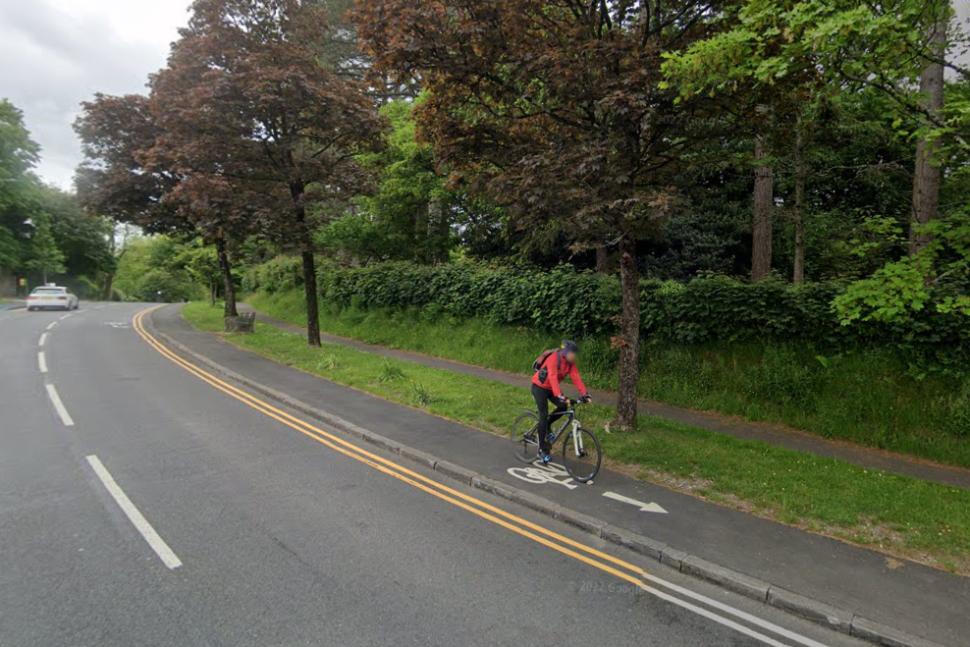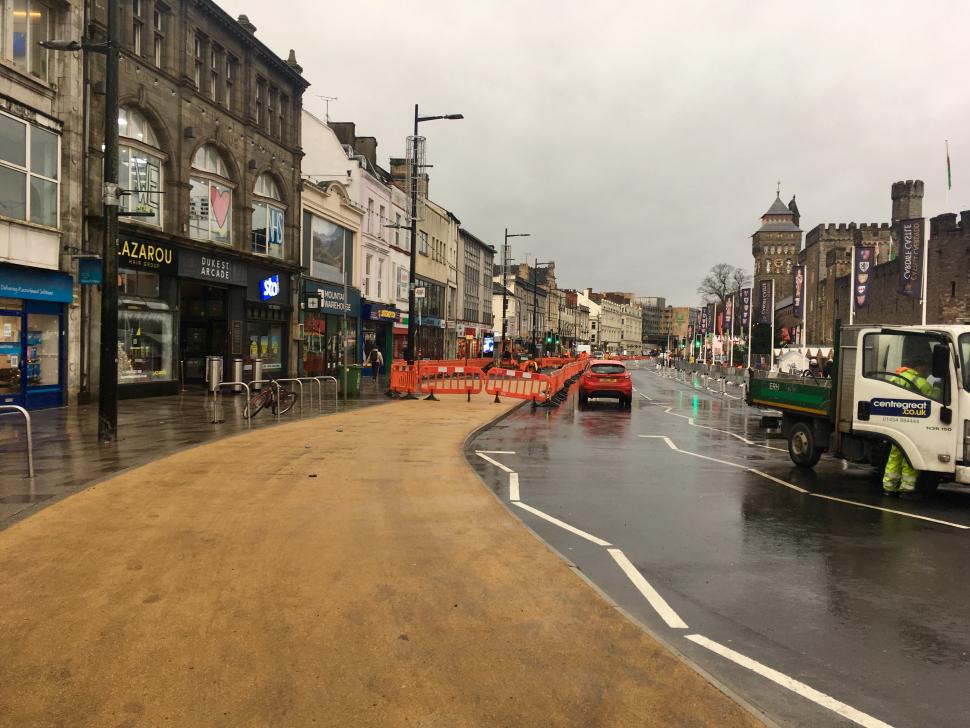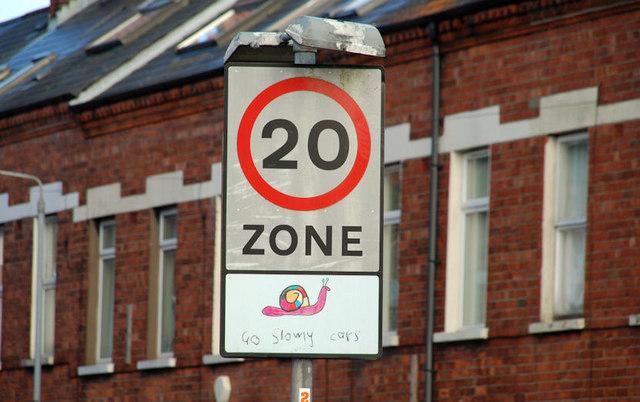- News
- Reviews
- Bikes
- Components
- Bar tape & grips
- Bottom brackets
- Brake & gear cables
- Brake & STI levers
- Brake pads & spares
- Brakes
- Cassettes & freewheels
- Chains
- Chainsets & chainrings
- Derailleurs - front
- Derailleurs - rear
- Forks
- Gear levers & shifters
- Groupsets
- Handlebars & extensions
- Headsets
- Hubs
- Inner tubes
- Pedals
- Quick releases & skewers
- Saddles
- Seatposts
- Stems
- Wheels
- Tyres
- Tubeless valves
- Accessories
- Accessories - misc
- Computer mounts
- Bags
- Bar ends
- Bike bags & cases
- Bottle cages
- Bottles
- Cameras
- Car racks
- Child seats
- Computers
- Glasses
- GPS units
- Helmets
- Lights - front
- Lights - rear
- Lights - sets
- Locks
- Mirrors
- Mudguards
- Racks
- Pumps & CO2 inflators
- Puncture kits
- Reflectives
- Smart watches
- Stands and racks
- Trailers
- Clothing
- Health, fitness and nutrition
- Tools and workshop
- Miscellaneous
- Buyers Guides
- Features
- Forum
- Recommends
- Podcast
 Mayals Road active travel route, Swansea (credit: Google Maps)
Mayals Road active travel route, Swansea (credit: Google Maps)Welsh Labour government to prioritise walking projects over cycle lanes, as cycling campaigners fear "missed opportunity"
Cycling UK has warned the Welsh government that dropping cycling projects from its list of transport priorities would "risk missing the opportunity" to enable more people to access cycled journeys in the country.
The Welsh Labour Transport Secretary Ken Skates says the government has "listened to the people of Wales" and the immediate priority will be seeing active travel "first and foremost, through the eyes of those who are most vulnerable, elderly people, people who use wheelchairs".
Consequently, the BBC has reported "inclusive travel" will be the major priority moving forward, such as fixing pavements and implying less of a focus on cycle lanes and other cycling infrastructure.
"If our streets are safe for our most vulnerable, they'll be safe for all of us," Skates said, before suggesting that some of the most vulnerable "are scared to go out" because of "creaking infrastructure" and "things like the menace of e-bike misuse".
Skates has committed to maintaining the level of funding in 2025-26 to local authorities for transport schemes, with core funding for active travel at £15m. Of that, "60 per cent" must be used for "actual change on the ground", although the implication is that cycling projects will not be the priority.
"Rather than spend tax payers' money on administration and consultancy fees, councils will be able to invest in fixing pavements, dropping kerbs, installing seats, improving bus shelters and making streets safer for all," he added.
Cycling UK's Gwenda Owen said she fears that "without that investment in separate cycling infrastructure we risk missing the opportunity to enable more people to choose to cycle". She suggested it would undermine the "consistent investment in active travel" in recent years, with councils having been able to "really plan for the future".
Owen also spoke more widely of the need for active travel funding to be ring-fenced, as walking and cycling "very often politically [...] does not come on top of the agenda".
It all comes a few months on from the transport secretary claiming concerns from cycling campaigners were "unfounded" before using the introduction of mandatory 20mph speed limits as evidence the government has "implemented the biggest road safety initiative in 25 years".
However, Senedd member and former climate change deputy minister Lee Waters called the claims "deeply disingenuous" and accused the government of "using the drop in casualties on 20mph roads to justify cutting back on active travel".
Waters continued: "The latest stats show an increase in casualties on roads where the speed limit is over 40mph, and a coroner in Bridgend raised concerns about the lack of safe infrastructure for cyclists on busy roads.
"If there was sincere concern for vulnerable pedestrians then taking forward proposals to tackle pavement parking would be high on the priority list — and it is not."
Skates called Waters "hot headed" on BBC Politics Wales and said it was "difficult to dispute" that 20mph speed limits would be effective as "organisations like Cycling UK were adamant that 20mph would make roads safer for cyclists".
Cycling UK hailed the impact of the widespread 20mph speed limit implementation, calling it the "single most significant change we've ever seen" after the data revealed 100 fewer people have been killed or seriously injured on Welsh roads since the change.
Dan is the road.cc news editor and joined in 2020 having previously written about nearly every other sport under the sun for the Express, and the weird and wonderful world of non-league football for The Non-League Paper. Dan has been at road.cc for four years and mainly writes news and tech articles as well as the occasional feature. He has hopefully kept you entertained on the live blog too.
Never fast enough to take things on the bike too seriously, when he's not working you'll find him exploring the south of England by two wheels at a leisurely weekend pace, or enjoying his favourite Scottish roads when visiting family. Sometimes he'll even load up the bags and ride up the whole way, he's a bit strange like that.
Latest Comments
- mark1a 20 min 44 sec ago
It's possible the issue is less to do with the Bluetooth connectivity (although it's sort of related) and that's because your workout coaching...
- AidanR 29 min 45 sec ago
I can't help but think that wank-panzers doing 40mph by an elementary school is more dangerous than cyclists doing 10mph.
- chrisonabike 1 hour 32 min ago
Apparently I liked that comment, but I have no memory of that....
- StevenCrook 1 hour 35 min ago
All of your price links appear to be pointing to the non pro version...
- Surreyrider 2 hours 22 min ago
Good try. Won't work.
- Surreyrider 2 hours 24 min ago
More than six times over the legal limit? She's the winner here. Her punishment is insufficient.
- Smoggysteve 2 hours 38 min ago
Sram only have a foot in the market with regards to road bike abd mountain bike (and loose variations of) The rest of the bicycles sold around the...
- wtjs 3 hours 54 min ago
so my hands are near the brake levers...


Add new comment
35 comments
Those exceptional riding skills of yours must come in handy when riding with that self-blowing trumpet attached to your handlebars.
Whilst your own sneer-klaxon is still in full working order I see. Have you automated it or do you really really enjoy the anticipation of pressing its button every 5 minutes?
I'm 76 and can't easily turn on the sadddle to look back. Modern handlebar mirrors are actually much better than a look-back as they have a wide and clear view, don't shudder and allow us to see both forwards and backwards in less than a second, unlike the saddle-squirm that can blind one to events to the for'ard for just long enough to hit them.
I also maintain my bike and the riding apparel, as with every other gubbins I use. Not doing so is just a lazy neglect of learning how then doing it. The lack of confidence is an issue, both for riding properly and for maintaining the bike so as to do so. As with motorised drivers, incompetence should be a reason for not-using; or for being trained until the incompetence and associated lack of confidence disappears.
It's much easier to learn to road cycle when the roads aren't infested with hordes of motorised loons, though. Motorised looning really needs to be much more severely policed and prevented, by all sorts of possible means not implemented because of motornormativity and its support by "the authorities", from newspapers to judges and politicians.
Once the cycling proficiency test was de rigeur but those days are long gone. Many here will cry "curtailment of freedom" but I would have some means to ensure that bike buyer-users are competant to ride on the road before letting them out on those roads. After all, the reams of highway code stuff apply to cyclists too, as does the ability to control a machine one uses, for the benefit of one's own wellbeing as well as that of other road users.
There is, in practice, still a lot of places where learning to ride a bike, including the rules of the road, are possible without the danger of loon-traffic and a lack of experience in dealing with it. What there isn't is a well-orgnaised enough infrastructure and legal requirment to do so before buying and riding a bike "in the wild". CyclingUK and some others provide a bicycling teaching structure but it's not used by nearly enough new bike riders.
One place to learn would be school playgrouinds and playing fields, as used to happen in the days of the cycling proficiency test. But schools now seem to operate only according to the latest crap ideology imposed by some silly new minister-of-the-month, with many necessary skills and understanding for use in everyday life completely purged from the syllabus.
Virtually anyone who rides a bike even semi-regularly, provided they don't have a disability preventing them from doing so, can do this. Lots of people don't but that's not because they can't, it's because they're being careless. You only have to look at the number of people (pretty much all of them, one sometimes feels) on Lime bikes are who are capable of riding along with one hand controlling the bike whilst texting with the other and certainly not looking forwards. Your skills really aren't as unique as you imagine.
While wheelying?!
Pages